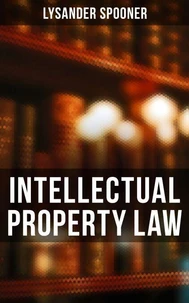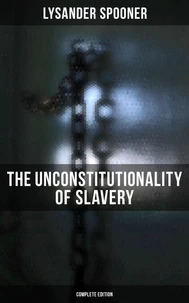The Unconstitutionality of Slavery. Challenging Injustice: A Legal and Moral Argument Against Slavery
Par :Formats :
Disponible dans votre compte client Decitre ou Furet du Nord dès validation de votre commande. Le format ePub est :
- Compatible avec une lecture sur My Vivlio (smartphone, tablette, ordinateur)
- Compatible avec une lecture sur liseuses Vivlio
- Pour les liseuses autres que Vivlio, vous devez utiliser le logiciel Adobe Digital Edition. Non compatible avec la lecture sur les liseuses Kindle, Remarkable et Sony
 , qui est-ce ?
, qui est-ce ?Notre partenaire de plateforme de lecture numérique où vous retrouverez l'ensemble de vos ebooks gratuitement
Pour en savoir plus sur nos ebooks, consultez notre aide en ligne ici
- Nombre de pages198
- FormatePub
- ISBN406-4-06-620862-2
- EAN4064066208622
- Date de parution12/12/2019
- Protection num.Digital Watermarking
- Taille582 Ko
- Infos supplémentairesepub
- ÉditeurGOOD PRESS
Résumé
In "The Unconstitutionality of Slavery, " Lysander Spooner presents a compelling legal and philosophical argument challenging the legitimacy of slavery as sanctioned by the U. S. Constitution. Written in 1845, Spooner's work employs a rigorous analytical style, deftly interweaving moral reasoning with constitutional analysis. He asserts that slavery is inherently inconsistent with the foundational principles of liberty and justice enshrined in the Constitution, calling into question the interpretations of legal authorities of his time.
His use of reasoned discourse along with passionate prose situates the text within the abolitionist discourse, adding a critical voice to the contemporary debates surrounding legal and moral obligations to end slavery. Spooner, a prominent American lawyer and political theorist, was a fervent advocate for individual liberty and civil disobedience. Raised in a society that accepted slavery, his intellectual journey led him to vehemently oppose it, influenced by Enlightenment ideals and his own strong beliefs in natural rights.
His legal background provided him with the tools to dissect and challenge the legal justifications for slavery, making his work not just a moral indictment but also a formidable legal argument against the institution. This book is essential reading for anyone interested in American political thought, legal history, or abolitionist literature. Spooner'Äôs incisive reasoning and eloquent prose illuminate the contradictions of the legal system in relation to slavery, compelling readers to reflect on the ongoing struggles for justice and equality.
It serves as a powerful reminder of the importance of moral integrity in law and governance.
His use of reasoned discourse along with passionate prose situates the text within the abolitionist discourse, adding a critical voice to the contemporary debates surrounding legal and moral obligations to end slavery. Spooner, a prominent American lawyer and political theorist, was a fervent advocate for individual liberty and civil disobedience. Raised in a society that accepted slavery, his intellectual journey led him to vehemently oppose it, influenced by Enlightenment ideals and his own strong beliefs in natural rights.
His legal background provided him with the tools to dissect and challenge the legal justifications for slavery, making his work not just a moral indictment but also a formidable legal argument against the institution. This book is essential reading for anyone interested in American political thought, legal history, or abolitionist literature. Spooner'Äôs incisive reasoning and eloquent prose illuminate the contradictions of the legal system in relation to slavery, compelling readers to reflect on the ongoing struggles for justice and equality.
It serves as a powerful reminder of the importance of moral integrity in law and governance.
In "The Unconstitutionality of Slavery, " Lysander Spooner presents a compelling legal and philosophical argument challenging the legitimacy of slavery as sanctioned by the U. S. Constitution. Written in 1845, Spooner's work employs a rigorous analytical style, deftly interweaving moral reasoning with constitutional analysis. He asserts that slavery is inherently inconsistent with the foundational principles of liberty and justice enshrined in the Constitution, calling into question the interpretations of legal authorities of his time.
His use of reasoned discourse along with passionate prose situates the text within the abolitionist discourse, adding a critical voice to the contemporary debates surrounding legal and moral obligations to end slavery. Spooner, a prominent American lawyer and political theorist, was a fervent advocate for individual liberty and civil disobedience. Raised in a society that accepted slavery, his intellectual journey led him to vehemently oppose it, influenced by Enlightenment ideals and his own strong beliefs in natural rights.
His legal background provided him with the tools to dissect and challenge the legal justifications for slavery, making his work not just a moral indictment but also a formidable legal argument against the institution. This book is essential reading for anyone interested in American political thought, legal history, or abolitionist literature. Spooner'Äôs incisive reasoning and eloquent prose illuminate the contradictions of the legal system in relation to slavery, compelling readers to reflect on the ongoing struggles for justice and equality.
It serves as a powerful reminder of the importance of moral integrity in law and governance.
His use of reasoned discourse along with passionate prose situates the text within the abolitionist discourse, adding a critical voice to the contemporary debates surrounding legal and moral obligations to end slavery. Spooner, a prominent American lawyer and political theorist, was a fervent advocate for individual liberty and civil disobedience. Raised in a society that accepted slavery, his intellectual journey led him to vehemently oppose it, influenced by Enlightenment ideals and his own strong beliefs in natural rights.
His legal background provided him with the tools to dissect and challenge the legal justifications for slavery, making his work not just a moral indictment but also a formidable legal argument against the institution. This book is essential reading for anyone interested in American political thought, legal history, or abolitionist literature. Spooner'Äôs incisive reasoning and eloquent prose illuminate the contradictions of the legal system in relation to slavery, compelling readers to reflect on the ongoing struggles for justice and equality.
It serves as a powerful reminder of the importance of moral integrity in law and governance.









